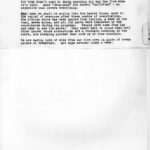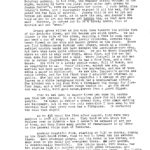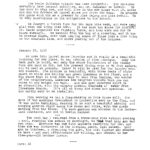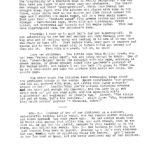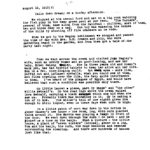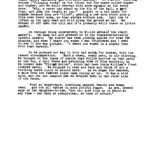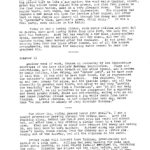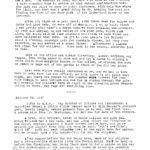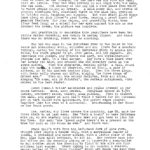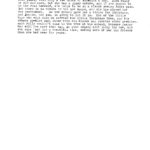Pine Mountain Settlement School
Series 09: BIOGRAPHY – Staff
Series 07: DIRECTORS
Evelyn K. Wells
1916 Excerpts from Letters Home
EVELYN K. WELLS 1916 Excerpts from Letters Home
Evelyn K. Wells:
Secretary 1916 – 1931
Acting Director 1931
TAGS: Evelyn K. Wells, transcriptions, letters, PMSS early history, Greasy Creek, Katherine Pettit, Ethel de Long, Mary Sinclair Burkham Memorial Schoolhouse, moonshine, House in the Woods, Viper KY, Christmas events, Line Fork, Gabes Branch, Old Log, Big Log, community
TRANSCRIPTIONS: Evelyn K. Wells 1916 Excerpts From Letters Home
1916 January 18 [024, p.1a] We’ve had a cold snap here, three bitter cold days, but only once did it go down below zero. …
We’ve had a cold snap here, three bitter cold days, but only once did it go down below zero. Now it is moderating again and we’re all relaxing from the effort of keeping warm. The cold has produced a wave of homesickness among the children, for they aren’t used to doing anything but hug the fire when it’s cold. Some “drop-outs” who weren’t “satisfied” — an adjective that covers everything.
Next week we shall be moving into the Laurel House, much to the relief of everyone after these months of overcrowding. The kitchen stove has been hauled from Incline, a week on the road, seven miles, and all its parts were inspected by the countryside during its progress. People have come from far and near to see the stove! They heard tell it could feed 500! Other Laurel House attractions are a fountain bubbling in the court, the sleeping porches that look up at Pine Mountain,.
We are having lots of milk from our five cows — a glass of cream apiece at breakfast. And eggs several times a week.
1916 Winter [025, p.1b] Helen Strong [Teacher 1916-18] and I had a lovely trip recently. We started Saturday morning, in the snow, the weather having changed in the night, walking by turns the first three miles down Greasy ….
Helen Strong and I had a lovely trip recently. We started Saturday morning, in the snow, the weather having changed in the night, walking by turns the first three miles down Greasy to Joanna Turner’s, where we collected her horse. I rode Bobby, Miss [Ethel] de Long‘s horse, and I thoroughly enjoyed it all the way, for he paced and was full of spirits. Joanna told us not to let any horses get ahead of hers, as it made him mad, and Joanna’s maw told us not to let any horses get behind him, as that made him mad! However, he turned out to be a lovely horse, full of spirits and not “mean.”
Greasy grows wilder as you work down towards the Middle Fork of the Kentucky River, and the houses are miles apart. We had dinner by the side of the creek, building a fire to cook bacon and heat a can of soup. Such lovely hillsides, covered with beech forest on one side and laurel growth on the other. There are flat bottom-lands further down Greasy, which in a thickly settled country would not have escaped the inevitable corn crop, but here they were quite unspoiled. We got to Henry Chappell‘s, where we were to stay over night, about four, and the sun had been down for an hour and a half. Henry Chappell is an old man who is rather progressive, and he has a fine farm, and a nice house. His wife is a lovely gentle woman, full of humor, and so hospitable to us. Their children, except one son, are married and have moved away from the mountains, and one of them edits a paper in Middlesboro. We saw Mrs. Chappell‘s quilts and woven covers, and for the first time I acquired an interest in quilts. She had one which was beautiful – a design of red palm leaves on a white background which had a Scandinavian effect. The kitchen was a big room with a fireplace big enough for five-foot logs, and a very modern range beside it. At the other end was a well, with good water, served from a gourd dipper.
When we sat down to supper three men came in, cattle men from New Mexico. It is a stopping place for all kinds of people. we slept in rather a dressy room, with straw matting and wallpaper, but it was the only exception I have seen to the mountain rule that every room has a fireplace. It certainly was cold that night!
As we sat round the fire after supper, they were very anxious to know all about us. They told me all about the Wellses over on Cutshin — how I needn’t be ashamed of ‘ary one of them, and they found many points of resemblance in my folks to the general Wells cast of features.
Another beautiful ride, starting at 8:30 on Sunday, coming up the frost-bound river, where we had to break the ice several times. Such stunning gorges, and big rocks in the stream, and some snow on the holly and evergreen trees and Main [mountain] Laurel, is exceptionally beautiful. One little house, very small, was two stories high and painted white with green trimmings, and had an upstairs balcony fairly hanging over the creek. The little clearing was practically surrounded by a holly grove, such staunch, stylish little trees.
We stopped for a call on 109-year-old Uncle John Shell, whom we found splitting kindling. He was most entertaining, telling us all about the game one used to be able to catch, and conditions when the country was really wild. [See:Uncle John Shell to read the real story of this “oldest man.]
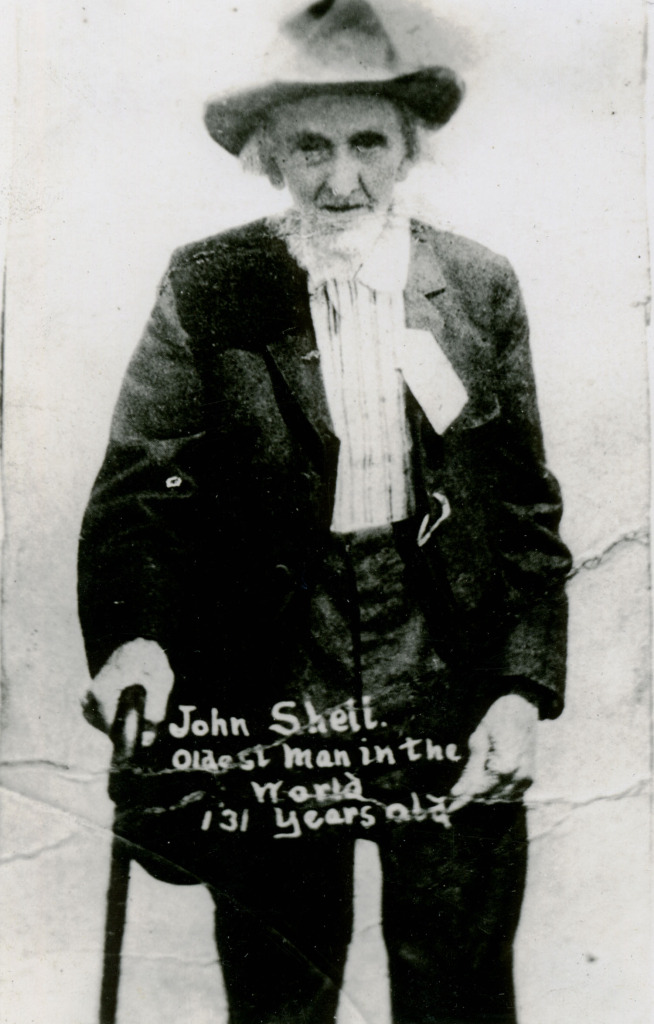
“John Shell, Oldest Man in the World, 131 Years Old.” [Vl_36_1160b.jpg]
The whole Callahan episode [7 Callahan children brought to Pine Mountain Settlement School by their father] has been wonderful. The children certainly have unusual qualities, and Mr. Callahan is lovely. He has come to stay now, and will live in the new house with Mr. [Luigi] Zande and run the furnace at Laurel House and drive the team. He brought six goats with him as a present to Miss de Long and Miss Pettit. He is very punctilious in his obligations to the School.
We fought a forest fire for two days this week, and were very glad when the thing died down. It was much too close for comfort. Mr. Zande organized the fighting force, and they were out for 24 hours straight. We watched from the top of a clearing, and it was an awesome sight, with that leaping snake of flame like a live thing on the mountain side, and smoke pouring out of the hollows.
1916 January 22, 1916 [026, p. 2] We move into Laurel House Thursday and it really is a beautiful building for any place, to say nothing of Pine Mountain.
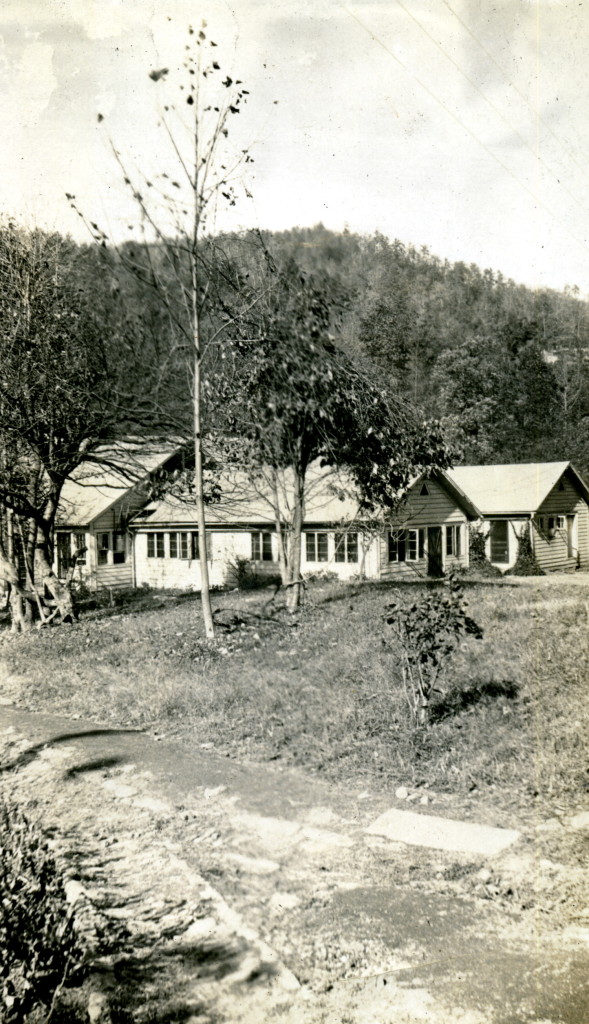
“Pine Mountain Settlement School. 1923 – 4 – 5” – Laurel House I. [nesb_073_mod.jpg]
We move into Laurel House [Laurel House I] Thursday and it really is a beautiful building for any place, to say nothing of Pine Mountain. Only the back part is built, and only the stone foundations of the dining room are laid so far, but the present dining room is 40 feet square, all we need at present. Later it will be used for the laundry room and classes. The kitchen is beautiful, with three coats of white paint on walls and ceiling and green linoleum on the floor, and a big stove that it took nine days to haul from Incline, the wonder of the neighborhood, likewise the weighted windows that you can raise to any height you want. And the open concrete court is so attractive, with its clearly gushing fountain of water from Limestone Branch. It’s all so sunny and clean and spacious. We can hardly wait to be installed.
This morning we had a flag-raising on Pole House Hill. The Sons of the American Revolution in Louisville sent us the flag, and it was quite thrilling, raising it on such a beautiful morning and singing “America” right among the rocks and rills, with the music echoing from the trees. I’m sure “America” was written in the Cumberland Mountains, and not in Newton Centre!
The next day I returned from a three-hour ride without meeting a soul, reaching the school by moonlight, to find that Loly Ann had run away. Everyone was out with lanterns searching for her, and then she was discovered in the sleeping porch, fast asleep. Loly Ann is thirteen, a strapping big girl, the best fighter and swearer we have — and most affectionate and willing, and devoted to her five-year-old brother Marcus.
1916 March 26 [027, p. 3] Last night Miss Katherine] Pettit and I took supper at Henry Creech‘s. The hospitality of a mountain home is really delightful… (p.3)
Last night Miss Katherine] Pettit and I took supper at Henry Creech‘s. The hospitality of a mountain home is really delightful.
1916 [?] August 12 [028-029, pp. 3a-3b] Calls down Greasy on a Sunday afternoon…
Calls down Greasy on a Sunday afternoon.
We stopped at the second ford and sat on a big rock watching the fish play in the deep green pool at our feet. The Turners, several of them, came along from the railroad – children, most of them two and three deep on a nag. One boy was wakening the echoes of the hills by shooting off firecrackers as he rode.
When we got to the Begley settlement we stopped and passed the time of day with Mrs. D.B. Creech and July, who were gathering beans in the garden, and from them got a tale of the party last night.
Then we went across the creek and visited John [?] Begley’s wife, such an untidy woman and so good-looking, and saw her baby, Ethel de Long Begley. She is three years old and doesn’t walk yet, has had thyroid tablets to keep her alive all her life. She is a fat, nice-looking child. But such eyes – sore lids, puffed out and inflamed eyeballs, what you could see of them, and flies crawling over the lids, the baby quite indifferent to them. I’ve heard of the plagues of Egypt, and would have believed that such a condition was possible only there.
Up Little Laurel a piece, past Cy Boggs‘ and “the other” Willie Metcalf‘s. On the road high above the creek walked Dora Metcalf, carrying a black satchel which she hid when she saw us. Probably there was moonshine in it. Cy is making a lot of it now. The miller’s toll of one-eighth gives him enough to ‘still [distill] liquor, even in these days when corn is high.
In a little patch of corn way down in the bottom is Abner Causey‘s new house — one room, log, with, corn planted thick around it. Tom Harris was playing a banjo in front of the door. We went down through the corn — no path — and he picked us a tune on the banjo. What a picture — the little house, a plant of “seven sisters” (zinnias), Abner on a log, Tom and his banjo, the corn, the huge hemlocks and beeches surrounding the clearing. And there are hundreds of houses just like that.
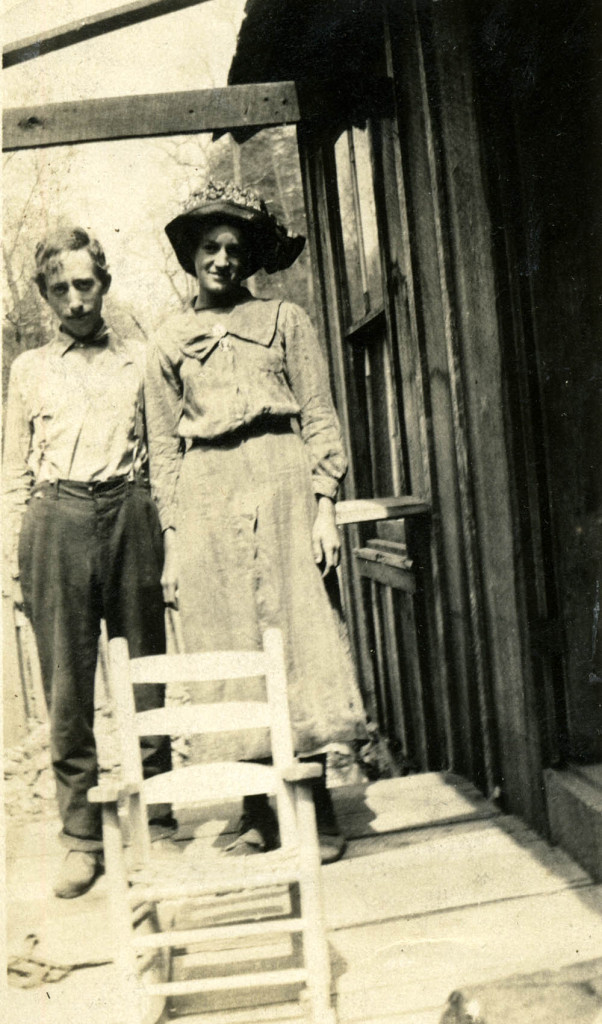
Friends & Neighbors: “Abner Causey.” [Written beneath the picture: “Abner Corsey ?”] Man and woman standing on porch with hickory cane chair placed in front. The Causey families were the master chairmakers in the community. [Vl_35_1154.jpg]
[p.3b] Up the branch, getting wilder and wilder and more beautiful as it became more remote. We stopped and drank a bottle of ginger ale and then started on. Then one of us almost stepped on a big black racer, squealed, and retreated hastily. We started throwing stones (“flinging rocks” is the idiom) but the snake coiled higher and higher, and we would retreat with more squeals at its every move. “Why, a racer can stand on the tip of its tail, a yard high, and Jump its length at you.” August is a bad month for snakes because they are “blind”, getting a new skin which puts a film over their eyes, so they strike without aim. Ugh! how it lifted up its ugly head and slid along the ground at us. We stoned it off down the hill and it’s probably still there on Little Laurel.
On through thick undergrowth to Willie Metcalf the chair-maker’s. He came out and greeted us in his characteristically careful speech: “My sister has been picking apples for some few minutes, and when I heard you women I was frightened and I went
to see if she was alright. “I heerd you women in a mighty fray with that varmint.”
So we pursued our way in this bad month, for snakes, with the utmost circumspection. Such a steep, bosky [?] path, no air stirring. We thought of the loads of chairs that Willie carries up that path. At the top, a rail fence and a stunning view of Pine Mountain, as we looked down “Tilled Holler”, which had been Uncle William [Creech]‘s first cleared patch. We stopped to rest and talk and think of all a visiting nurse could do around here. As we began the descent, a mule from the further slope came loping at us. It was a wild mule, and you can imagine how we dropped down on the other side of the fence.
What an experience, combining natural beauty and human need. And not all babies in such pitiful shape. As Mrs. Creech says of her daughter-in-law, “you can Just slip up on Renie at any time — her baby is always clean, at home or abroad,”
1916 October [030, p. 4] We are all moved into Laurel House, and it is really lovely…
We are all moved into Laurel House, and it is really lovely. The big dining room, 50 by 20, all windows on two sides, and with a big alcove that is like a sun parlor; the wood walls (poplar, oiled), great big window boxes filled with greens, and nice fern pieces on
the four round tables, make it a very pleasant room. The first supper there, last night, was very impressive. The children had learned a new psalm and hymn for service after supper, and after that we sang rounds and danced all through the rooms and porches
to “Lavender’s blue, Lavender’s green, dilly dilly.” It was a real party, even candles on the table.
Today we had a turkey dinner, with Uncle William and Aunt Sal [Creech] as guests, also Aunt Larthy Smith from Line Fork, the lady who had sent the turkeys. Aunt Sal was wearing a new blue linsey-woolsey dress, checked apron and kerchief, and new shawl, all her old clothes having been burned after the smallpox. It was great fun showing them over the house after dinner, and of all the modern arrangements, the drains for emptying water seemed to make the greatest hit.
1916 October 15 [030, p. 4] Another week of work, broken on Wednesday by the Cornerstone exercises of the Mary Sinclair Burkham Schoolhouse…
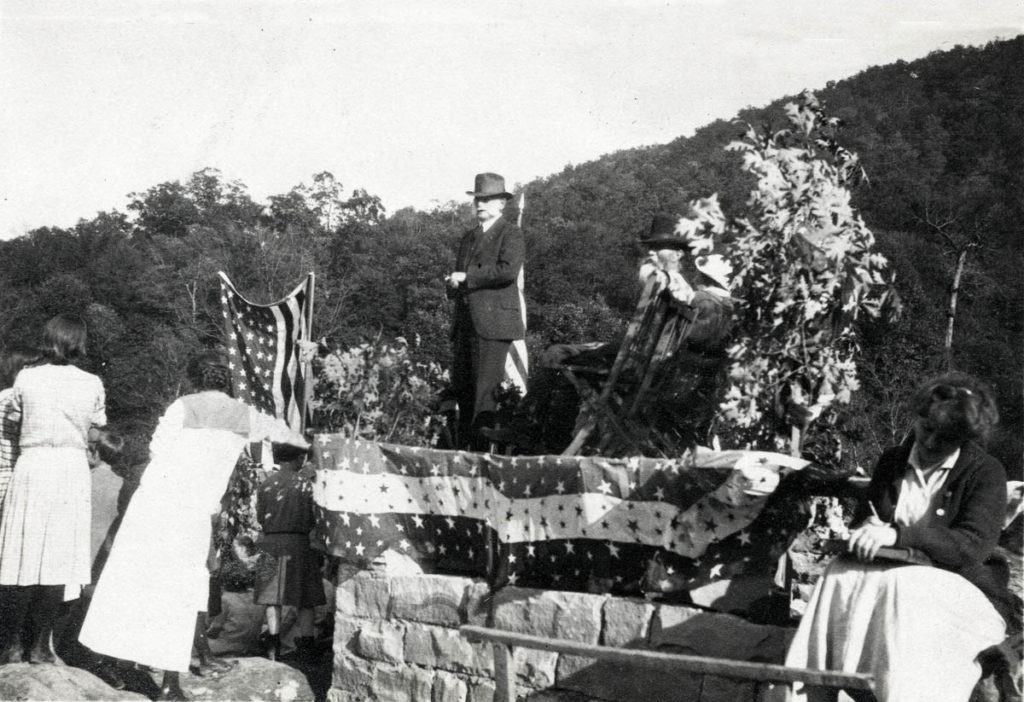
Mary Sinclair Burkham School House I. Laying of the cornerstone, October 1916.. [II_12-02_burkham_0424.jpg]
Another week of work, broken on Wednesday by the Cornerstone exercises of the Mary Sinclair Burkham Schoolhouse I. Flags and decorations, and a lovely wreath on the stone itself, and speeches by Uncle William, Miss de Long, and “Father Lord” [Daniel M. Lord III, Trustee], as we have come to call him. It was nice to have that touch, for he represented the outsider’s interest in the school. The children, from up and down Greasy for miles, and the Masonic Lodge, and all the community in general were there, and after we had sung “America the Beautiful” and “How Firm a Foundation“, and “Oh God Our Help in Ages Past,” we all adjourned to the playground for a squirrel and sweet potato roast, games and set-running, ending with an old man named Jonathan Gillam dancing a jig while Uncle John Lewis [Fiddler John Lewis] fiddled. Little Georgie, in her composition next day, wrote that “we ran sets in memory of Mary Sinclair Burkham.”
The other day, riding passed Uncle John Shell‘s, I saw a quaint procession passing, through the bottom land. Aunt Sis stalking along, behind her Uncle John with his beard and slouch hat, and after them a boy driving a sledge drawn by a team of oxen. They are getting in their corn because the sheep are eating it, and they have to work Sundays. Further along was Phronie Baker‘s house, smoke rising from the chimney and a little piq coming out of the doorway, and all the chickens on the porch.
Friday night Will Cornett took William, Green-Bailey and Marcus on a coon hunt. William had been talking for some days about going hunting, so Miss de Long finally arranged it, including the coon. Columbus had killed one the night before, and they stuffed the skin and stuck it up in a tree and Will shot it down, and the little boys brought it proudly home, eyes popping with excitement and sleepiness
1916 November 20 [031, p. 5] Saturday Miss [Angela] Melville, Miss Melcher and I rode to Harlan Town on a bat [?]. We started at noon, and got into town at six o’clock…
Saturday Miss [Angela] Melville, Miss Melcher and I rode to Harlan Town on a bat [?]. We started at noon, and got into town at six o’clock, a most romantic time to arrive in that rather unattractive town. The last six miles we rode in pitch blackness, with only the stars for light, and that was a great thing to do, keeping the road and finding the ford of the Poor Fork of the Cumberland River in the darkness.
After the night at a good hotel, with fresh meat for supper and baths and good beds, we were off at ten a.m., I on my mule, which I was pretty glad wasn’t a horse when we were crossing the mountain. We rode all morning up the valley of the Poor Fork, which runs along the south side of Pine Mountain and which is much wider and more cultivated than ours. We got to John Lewis‘s [John Lewis, mailman] (at Dillon) about 1 o’clock, somewhat late for mountain dinner, but they were expecting us and served us a grand dinner. Afterwards I played the organ for the children. Then back to the school, arriving just at dusk.
Days at the office are always diverting. Almost anything may happen, from being asked to come out and try a horse to holding a brute while some neighbor trades in the office, or driving the cows or geese or hogs out of the garden in front of the Old Log House.
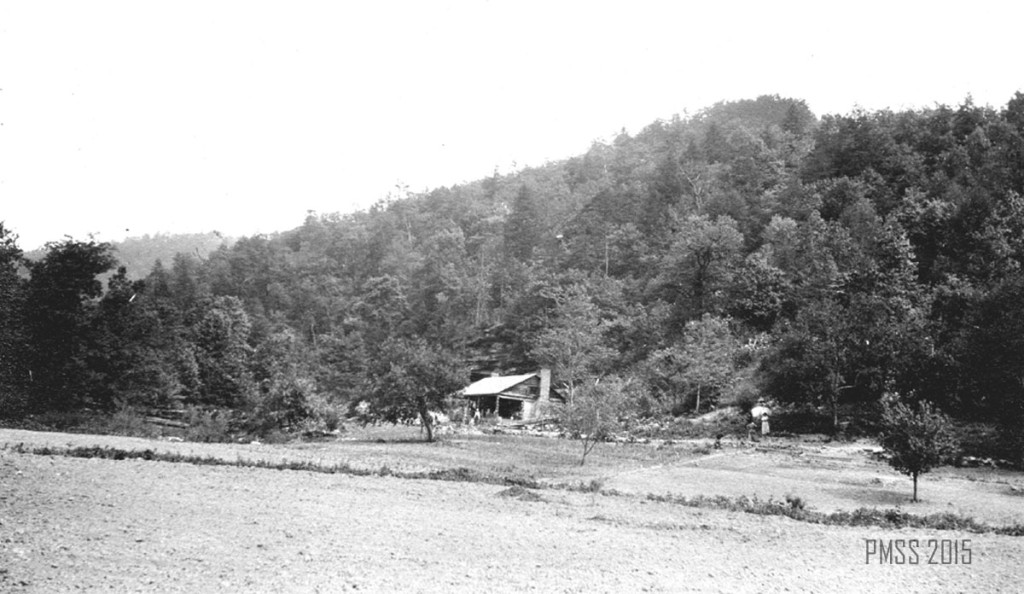
P. Roettinger Album. View of Old Log House and gardens from Pine Knoll. [roe_007a_mod.jpg]
Last week winter really descended on us, and we had to work hard to keep warm (in the Office), as this house is not built very tight, and there are cracks in the plaster between the logs, wide enough to look through and see who is coming through the gate. And keeping the children warm at night on the sleeping porch demands piling on coats, rag rugs and everything else.
1916 December 29 [031-033, p. 5-7] Gifts to E.K.W. [Evelyn K. Wells]: Big bunches of Hollies and Mistletoes; a hand-tied broom; a little willow basket made by Bill Causey’s youngest girl, Bessie Margit, return present from me to her …
Gifts to E.K.W. [Evelyn K. Wells]: Big bunches of Hollies and Mistletoes; a hand-tied broom; a little willow basket made by Bill Causey‘s youngest girl, Bessie Margit [Causey], return present from me to her, her first doll. A possum skin from Mr. Descharnps [Leon Deschamps] who had one for each of the workers.
A tree, duly trimmed, taken to Uncle William and Aunt Sal. Uncle William had a bad back, and was lying before the fireplace on the floor, resting against a chair turned upside down, and as we brought the lighted tree into the room he said, “Hit’s a-shinin’, haint it?” Aunt Sal sent Columbus [Columbus Creech] down to the apple hole for apples, and he brought back a big basket-full for all the children.
After supper before the Far House I tree, each of the children had a red-and-white stocking (from the Newton Unity Club) to hang up before the fireplace, and Santa Claus came in for a minute on his way up the rock-houses on the mountain top where he hides his presents every year, and then off to bed for the young. Bed for us at nine, having filled 34 as compared with 20 stockings last year.
3.30 a.m. Miss de Long and the boys up and singing carols under [p. 6] the windows of every house on the place, and up at Uncle Williams’.
Santa Claus was Ell Lewis, living [?] at Big Log, and in the next room to where he was dressing for the part was his wife and baby, with Dr. Little. They had been sitting up all night with the baby, who was sick. The doorway of Old Log was a fine place from which to watch people coming up Greasy. A mild sunny day, and crowds of people; sometimes two, sometimes three on the same nag, everyone in holiday mood, laughing and singing. But when Stacy Ellen Boggs came along on Judy Turner‘s pied horse, bearing a great bunch of peacock feathers for Miss de Long, and gracefully waving them (four feet long) as a shield for her eyes against the sun as she crossed the creek, the picture was complete.
And practically no moonshine this year.There have been two stills raided recently, and nobody is making liquor. And since there was no drinking, there was no shooting.
The 500 who came to the Christmas Tree in the House in the Woods sat absolutely still, children and all (rare for a mountain throng), during the reading of the Christmas Story by Angela Melville, the short prayer by Mr. Crit Lewis, and the pageant. Mr. Deschamps was Joseph, May Ritchie [oldest sister of noted dulcimer player, Jean Ritchie of Viper, KY.] was Mary, and three-year-old Frances the baby, in a real manger. May wore a blue scarf over her lovely red hair, and crooned the old Coventry Carol as the scene opened. Then the shepherds, bearing gifts: a ball, round like the earth, a bunch of cherries, red as blood, a pair of mittens, as in the ancient mystery play. Then the Three Kings, with their holly staves and gifts, singing “We Three Kings of Orient Are.” Then all the school children, from all sides, singing “Oh Come, All Ye Faithful“, the refrain antiphonal, with unison on the last repeat.
Lunch (peanut butter sandwiches and yellow cheese) on Far House terrace. Naps, much needed. Christmas dinner at 3:30: turkey, cranberry sauce, celery, plum pudding. Then to collect the mail, and supper at Aunt Sal‘s while I waited for it: Moccasin pie (a tart filled with applesauce, the pastry edges pinched together like the seam of a moccasin). Set-running at Far House on the front porch.
Mrs. Farley, who lives across the mountain, age 69, made her first visit to us last week. She “felt a bound” to take Christmas with us, so she started long before dawn and got here in time for the Tree. She said “she owed maybe there’d be a present on the tree for such an old woman as she.” And there was.
Frank Hall‘s wife from the left-hand fork of Line Fork, brought Miss de Long a wooden doll, with a marvelous number of joints, a grotesque and clever affair, with a little chair of its own, like our split bottomed, to sit in. Her brother came into the office one day recently asking me to typewrite a song-ballet he had written about the drowning by flood of his wife and four children last summer. Other typing to do: copying a stained, ragged ballad of “The Dying Soldier” which Art Boggs had sung when courting Stacy Ellen, which has been in his pocket ever since.
The School’s present to Aunt Polly Ann Day:
The Days have moved from the old house on the Incline road to a new one-room house at the Head of Gabes Branch, a very lonesome place, with only a few hours of sunshine a day. Aunt Polly is old and sick, but she has a gypsy nature, and if she cannot be on the road herself, she longs to be at a window seeing folks pass. But there is no window in the new house, and she has missed her one excitement. So the School gave her a window for Christmas, and Jasper, her son, is going to put it in. One of the little boys who went with us carried the little Christmas Tree, and the others spelled each other with the window and carried other pretties. Aunt Polly couldn’t come to the tree at the School, because Jasper had sold the mare that day, so Miss de Long sent Bobby for her, and she came and had a beautiful time, seeing more of her old friends than she had seen for years.
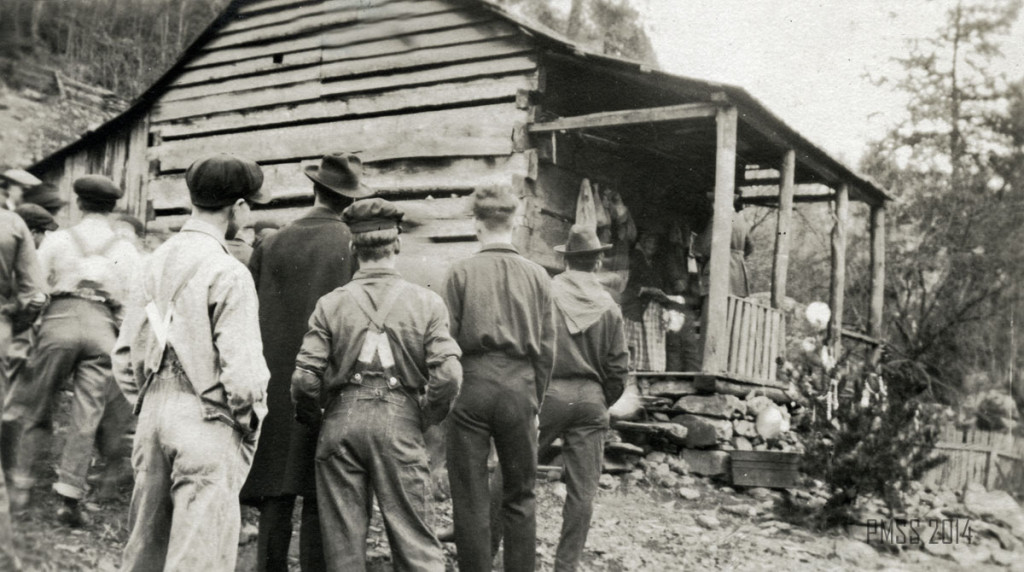
Bringing the window to Polly Ann Day’s house on Christmas Day, 1916. [christmas_983.jpg]
GALLERY: Evelyn K. Wells 1916 Excerpts From Letters Home (Transcriptions)
- Evelyn K. Wells 1916 Transcriptions. [well_hist_024.jpg]
- Evelyn K. Wells 1916 Transcriptions.[well_hist_025.jpg]
- Evelyn K. Wells 1916 Transcriptions.[well_hist_026.jpg]
- Evelyn K. Wells 1916 Transcriptions. [well_hist_027.jpg]
- Evelyn K. Wells 1916 Transcriptions. [well_hist_028.jpg]
- Evelyn K. Wells 1916 Transcriptions. [well_hist_029.jpg]
- Evelyn K. Wells 1916 Transcriptions. [well_hist_030.jpg]
- Evelyn K. Wells 1916 Transcriptions. [well_hist_031.jpg]
- Evelyn K. Wells 1916 Transcriptions. [well_hist_032.jpg]
- Evelyn K. Wells 1916 Transcriptions. [well_hist_033.jpg]
Return to:
EVELYN K. WELLS Guide to Excerpts From Letters Home 1915-1923
See Also:
EVELYN K. WELLS Biography
EVELYN K. WELLS Record of Pine Mountain School Guide 1913-1928 [INDEX] – Early in-depth history of Pine Mountain Settlement School
EVELYN K. WELLS Guide to Excerpts From Letters Home 1915-1923
EVELYN K. WELLS 1915 Excerpts
EVELYN K. WELLS 1916 Excerpts
EVELYN K. WELLS 1917 Excerpts
EVELYN K. WELLS 1918 Excerpts
EVELYN K. WELLS 1918 Excerpts – Horseback to Hindman
EVELYN K. WELLS 1919 Excerpts
EVELYN K. WELLS 1920 Excerpts
EVELYN K. WELLS 1921 Excerpts
EVELYN K. WELLS 1922 Excerpts [in progress]
EVELYN K. WELLS 1923 Excerpts [in progress]
EVELYN K. WELLS PUBLICATIONS
EVELYN K. WELLS, “A Little True Blue American 1920”
EVELYN K. WELLS TALKS
EVELYN K. WELLS Harvard University Address 1955

